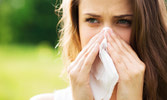With winter ending, the spring weather is right around the corner. We look forward to the warmer days, blooming flowers, and resurrected fields of green. But no one is looking forward to the allergens that spring brings. If you have allergies, you are used to itchy eyes, sneezing, and a runny nose, but do you know what's causing those symptoms? If you live in an area that gets a lot of snow in the winter and you feel like you are experiencing allergy symptoms earlier than usual, it may be because of snow mold. Continue reading to learn more about snow mold and how to manage your allergies.
What Is Snow Mold?
Snow mold is a fungal lawn disease that occurs after snow melts in the spring. Snow mold usually occurs after the first large snowfall of the season. The reason being is that it creates the perfect blanket between the grass and snow for fungus to grow. The fungal spores live in the soil all year round, but they remain inactive. When the temperature gets warmer in the spring, the melting snow drenches the soil and the spores sprout and spread.
Snow Mold Allergy Symptoms
Snow mold can cause the common rhinitis symptoms of a runny and itchy nose, itching in the throat area and even itchy, watery eyes. Symptoms can vary as no two people are the same and it depends on what the person is allergic to.
Snow Mold Allergy Prevention
There are a few ways to avoid snow mold from growing on your lawn. For starters, before snow starts falling, rake up leaves in your yard and cut the grass shorter than normal. This will eliminate breeding grounds for mold. Another way to do this is by breaking up large snowbanks when the snow begins to melt. This allows them to melt faster, avoiding letting the snow cover damp ground. If you find your lawn has snow mold, it is good to get it raked up and off your lawn. While doing this, it is recommended that you wear a face mask to avoid triggering allergy symptoms.
Why It Is Important to Have Allergy and Asthma Medicine on Hand
If you have asthma and allergies, chances are your symptoms will get worse in the springtime. Always continue taking your doctor-directed OTC or prescribed medications. These will help manage allergy symptoms during this season as well as minimize your reaction to triggers such as pollen or mold. If you are someone with asthma, it is important to always carry your inhaler with you, especially when outside. You never know what might trigger a severe reaction, so it is best to always have it with you.
If you’re concerned about allergies or have questions, feel free to reach out to our experts at PulseAir. We’ll be happy to help!


